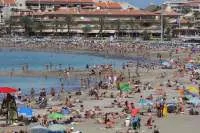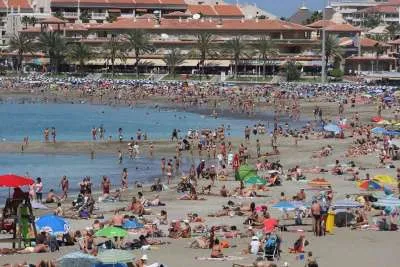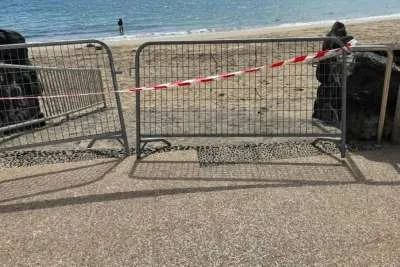Side Hustles in the Sun: New digital economy jobs attracting ex-pats to the Canaries
- 28-10-2025
- Business
- Canarian Weekly
- Photo Credit: Freepik
Picture this: you're lounging at Las Canteras beach in Las Palmas, laptop balanced on your knees, sipping a café con leche that cost you less than half what you'd pay in Newcastle. Your mate back home is shivering through another grey drizzle, paying 40% tax on anything above £50,270, whilst you're enjoying sunshine, a 7% sales tax on your morning pastry, and income tax rates that start at just 18.5%.
Welcome to the new normal for thousands of digital workers who've discovered that the Canaries isn't just a holiday destination anymore, it's a full-blown remote work paradise.
The Great Digital Migration
Since 2020, between 15,000 and 20,000 digital nomads have been flooding into the Canary Islands annually. They're not just backpackers with Bitcoin, they're qualified professionals working legitimate remote positions for companies based everywhere from Curaçao to Copenhagen, and they're living their best lives whilst doing it.
The archipelago's recent embrace of Spain's digital nomad visa programme has transformed what was once a grey-area situation into a proper, legal pathway for long-term remote workers. And the jobs these folks are doing? They're as varied as the islands themselves.
What's Everyone Actually Doing Here?
Let's get real about the side hustles and full-time gigs that are paying the bills for expats soaking up that eternal spring weather.
Customer Support: The 24/7 Opportunity
One of the biggest draws for remote workers in the Canaries is the time zone advantage. Sitting at GMT (same as the UK, one hour behind most of Europe), the islands are perfectly positioned for customer service roles that need round-the-clock coverage.
Online gaming companies, including Tether casinos and other cryptocurrency platforms, are actively hiring remote customer support agents. These positions typically pay between £15-25 per hour (converting to euros, that's roughly €18-30), with many offering flexible shifts that let you surf in the morning and work in the evening.
The work involves handling player inquiries via live chat, email, and occasionally phone support. Companies provide comprehensive training, and many positions require no previous gambling industry experience—just excellent English, strong communication skills, and a reliable internet connection (which, let's be honest, is everywhere in Las Palmas and Santa Cruz at speeds up to 600Mbps).
Compare this to working the same role from a damp Newcastle flat: you'd be paying 20% tax on every pound above £12,570, then 40% above £50,270. In the Canaries, your tax bands are more generous—18.5% on income up to €12,450, gradually scaling to 45.25% only above €90,000. Plus, that 7% IGIC (the Canaries' version of VAT) versus 20% UK VAT means your money stretches considerably further on everything from groceries to your Friday night tapas.
Content Creation & Digital Marketing
The booming digital nomad scene has created its own ecosystem of work. Travel bloggers, Instagram influencers, and YouTube creators are producing content about island life, whilst companies, particularly those in the iGaming sector like USDT Casino operators, need content creators, social media managers, and SEO specialists who understand both the European and international markets.
These roles often pay project-based rates or monthly retainers ranging from €1,500 to €5,000+ for experienced professionals. Working for international companies means you can earn in stronger currencies whilst living with Canarian cost-of-living advantages.
Tech & Development Work
Software developers and programmers have discovered they can command London or Berlin salaries whilst enjoying Fuerteventura's surf breaks or Tenerife's hiking trails. Many work for companies registered in low-tax jurisdictions like Curaçao or Malta, enjoying the legal protections of employment contracts whilst living in the sunshine.
For those earning significant income, the Canaries' Special Zone (ZEC) offers corporate tax rates of just 4% for qualifying companies—a massive advantage over the UK's 25% corporation tax. This has led to a wave of entrepreneurial expats setting up their own consultancies and service companies here.
The Newcastle Comparison: Let's Do the Math
Imagine you're earning £40,000 (€47,000) annually working remotely. Here's what that looks like:
Living in Newcastle:
- Income tax: Approximately £7,486
- National Insurance: £3,644
- Council Tax (Band A): Around £1,600
- Pint of beer: £4-5
- Monthly rent (1-bedroom city centre): £800-1,000
- Weather forecast: 50% chance of rain on any given day (and that's being generous)
Living in the Canaries:
- Income tax: Approximately €5,800 (thanks to better initial bands)
- Social Security: Required, but comparable rates
- IGIC (sales tax) at 7% vs the UK's 20% VAT
- Pint of beer: €2-3
- Monthly rent (1-bedroom Las Palmas): €800-1,000
- Weather forecast: Sunshine, more sunshine, occasional cloud, then sunshine
- Beach access: Daily
- Hiking a volcano before work: Absolutely doable
The maths isn't exactly rocket science, is it?
Legal Considerations: No Dodgy Business
Here's the crucial bit that separates legitimate digital workers from the "laptop-on-the-beach-until-they-catch-me" crowd: proper tax residency.
If you're working remotely for a company based elsewhere (like a Curaçao-licensed casino operator), you'll need to understand your tax obligations. Spend more than 183 days in the Canaries, and you're a tax resident, which, given the perks, isn't exactly a punishment.
Non-EU citizens need work permits, though Spain's digital nomad visa has made this considerably easier. EU citizens (including Brits who established residency before Brexit) can work freely, though post-Brexit Brits need to navigate the new visa requirements.
The good news? The Canaries offer 99.9% inheritance tax relief for direct relatives and wealth tax rates starting at just 0.2%, far more generous than most of Europe. This has made the islands attractive not just for young digital nomads but for established professionals planning long-term futures here.
Where To Base Yourself
Las Palmas (Gran Canaria) is the undisputed king of the digital nomad scene. With over 25 coworking spaces, a thriving expat community, and Las Canteras beach on your doorstep, it's perfect for those who want city amenities with beach access. The "Live it Up, Las Palmas!" Slack community organises regular meetups.
Santa Cruz (Tenerife) offers a more residential feel with excellent coworking facilities and slightly lower tourist density than the south of the island. The trade-off? You're not literally on the beach, but you're close enough.
Fuerteventura (particularly Corralejo and Lajares) is the choice for surf-obsessed remote workers who don't mind a slightly quieter scene. It's dubbed the "Hawaii of Europe," and the kitesurf opportunities are genuinely world-class.
The Reality Check
Let's not pretend it's all sunshine and €2 beers. Remote work in the Canaries comes with challenges:
- Isolation: Despite the growing community, you might feel disconnected from family and friends back home.
- Language barrier: Outside tourist areas and expat hubs, Spanish (and specifically Canarian Spanish) is essential.
- Healthcare: You'll need private insurance or to navigate the Spanish public system, which is good but requires paperwork.
- Career progression: Remote work can sometimes mean you're passed over for in-office promotions.
Making It Work
The digital workers thriving here aren't just winging it. They're:
1. Properly legal: Sorted tax residency, got the right visas, paying into the system
2. Well-connected: Active in coworking spaces and digital nomad Facebook groups (Gran Canaria Digital Nomads has thousands of members)
3. Financially stable: They came with emergency funds and weren't gambling (pun intended) their last pennies on island life
4. Adaptable: Ready to embrace Spanish culture, not just recreating Little Britain in the sun
The Verdict
The Canaries have evolved from a package holiday destination to a legitimate remote work hub. Whether you're handling customer inquiries for international companies, building websites, creating content, or managing online operations, the combination of EU infrastructure, favourable tax treatment, affordable living costs, and genuinely glorious weather makes it an increasingly attractive option.
Could you do the same job from a rainy Newcastle flat? Absolutely. Would you want to once you've tried working from a terrace overlooking volcanic landscapes with a beach break at lunch? That's the question 15,000+ digital nomads have already answered.
The Canaries aren't just attracting holidaymakers anymore, they're attracting a whole new workforce who've realised that "office with a view" can mean something entirely different. And frankly, after your fifth consecutive day of 24°C sunshine in February, you'll understand why they're not going back.
Other articles that may interest you...
Trending
Most Read Articles
Featured Videos
TributoFest: Michael Buble promo 14.02.2026
- 30-01-2026
TEAs 2025 Highlights
- 17-11-2025































































